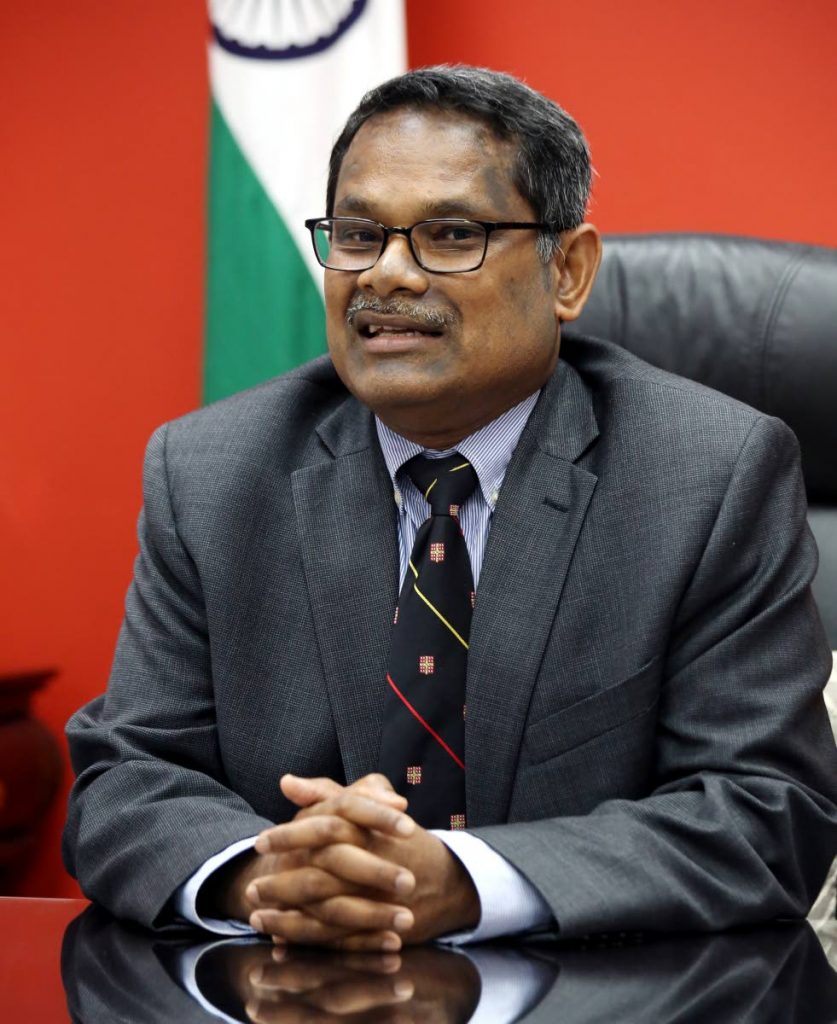Indian envoy: 'We've worked extra hard to bring vaccines to this country'

HIGH COMMISSIONER of India Arun Kumar Sahu says extra work was done to have covid19 vaccines brought from India to Trinidad and Tobago, even if the process began only after the TT government formally requested them.
Sahu explained the Indian government's formula for the distribution of vaccines, in light of their limited supply and high demand, during a television interview on local station WESN on Wednesday.
Sahu sidestepped questions on TT politics, citing his role as a diplomat, including his recent public exchange with the Prime Minister about vaccines coming from India. Some 40,000 doses are due to arrive in TT on Monday.
In March, Opposition leader Kamla Persad-Bissessar wrote to India asking for vaccines, saying, "Over the last two weeks, we have repeatedly asked the government of TT to reach out to your government for assistance."
Her request was criticised by the PM and Foreign Affairs Minister Amery Browne, who said was it inappropriate and interfered with the countries' bilateral relations. Sahu disagreed that Persad-Bissessar's letter was inappropriate.
Speaking with Newsday on Thursday, Browne said, "Of course the government wrote to India's prime minister (with a request for vaccines) before the Opposition Leader. It is on record and they know that."
Tensions were seemingly eased on March 22, when Browne and Sahu met and issued a joint release, noting consensus between the two countries, including a framework for having vaccines brought to TT.
During his WESN interview, Sahu was asked why he did not "push" to have vaccines in TT before government's request.
"That is not the Indian way of life.
"We don't put ourselves before everybody else, just because I am here and my family is here – there are millions and millions of people in India who have not been vaccinated.
"I can wait for the vaccine," Sahu said, although he and his staff will be vaccinated with doses from Monday's shipment.
He also said, "I can tell you with all sincerity that me, my team, (all my) colleagues in external affairs, I think have done extra work to bring the vaccines to TT."
Sahu suggested he would not have made a request simply because he and his family are residents of TT, or because he represents India in parts of the Caribbean.
He gave a brief idea of India's vaccine distribution programme, describing it as being at the "political level" which prioritises "neighbourhood" countries, starting with Bangladesh, then to "extended neighbourhood," then to other countries.
"And very specifically, he (India prime minister Narendra Modi) said all those countries who are small and those countries who might struggle to get vaccines and whether we can give something."
But Sahu clarified, "The leader, the prime minister, it is not his duty to decide the nitty-gritty of it. That would be for the foreign minister, external affairs minister, the health ministry... High commissioners are given a wider control of how things are going."
He said he believes Dominican Prime Minister Roosevelt Skerrit was the first Caribbean leader to seek out vaccines from India. Skerrit sought out the vaccines in January and the country received them about a month later, after which the Dominican leader said he "did not see the chances of getting such a swift positive response" from the Indian PM.
Sahu – who is also high commissioner to Dominica and Grenada – said, "I guess (he has a) keen observation of what is going on in India. I guess also his keen observation that as a small country, they have been devastated by (Hurricane) Maria. We have supported them, so he remembered."
He was asked whether the near two-month period from the request to delivery of the vaccines "made good time."
He replied, "I think you should start with this: I think in this situation, if you follow the CEO of Serum Institute (and what he has been) saying over the past two days, to get vaccines out of India is next to impossible now."
Serum Institute of India is the world's largest vaccine manufacturer and produces the AstraZeneca vaccine under licence.
The BBC reported on Wednesday that its production capacity is "very stressed," raising questions about the institute's ability to supply its own enormous domestic demand.
Sahu said people have asked him in public if and when the vaccine will come and he responded, "If you want to deal with India, follow Indian press and Indian media – don't follow colonial media."


Comments
"Indian envoy: ‘We’ve worked extra hard to bring vaccines to this country’"